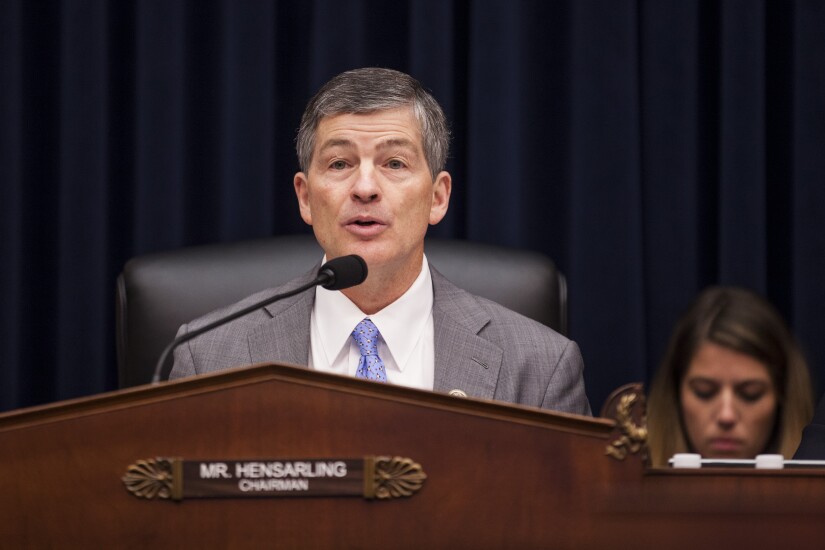
Several key policymakers affecting banking are among those exiting, including House Financial Services Committee Chairman Jeb Hensarling and Sen. Bob Corker, a top GOP member of the Senate Banking Committee. Another retiring lawmaker, meanwhile, Sen. Orrin Hatch of Utah, could cause a change of leadership of the Senate banking panel as Chairman Mike Crapo may take control of a different committee.
Most observers
"There are a few factors driving the House retirements," said Kyle Kondik, managing editor of Sabato's Crystal Ball at the University of Virginia's Center for Politics. "One is the political environment, which seems bad for Republicans, at least at the moment. Even safe-seat members might have an incentive to retire if they believe they will go from the majority to the minority, and swing-seat members may be worried about winning reelection and instead have decided to go out on their own terms."
Such factors appear to have persuaded lawmakers like Reps. Ed Royce and Darrell Issa, both of California, to retire. Both are from districts won by Hillary Clinton in 2016, signaling that Democratic opposition is likely to be strong.
But that is not the situation for Rep. Jeb Hensarling, the Texas Republican who chairs the House Financial Services Committee and whose seat is considered safe. But he was facing the end of his chairmanship due to GOP term restrictions.
"Many of these members are losing their chairmanships and they don’t want to go back to being a rank-and-file member in the majority or, even worse, the minority," Kondik said.
Still others, including Rep. Steve Pearce of New Mexico, are leaving one political office in an effort to gain another.
Following are the key Republicans set to leave at the end of the year.

House Financial Services Committee Chairman Jeb Hensarling
The Texas Republican has been at the forefront of banking policy for far longer than the six years of his chairmanship. He was an outspoken and influential conservative voice during the debates leading up to the Dodd-Frank Act, frequently clashing with then-Chairman Barney Frank.
Hensarling is likely leaving because his term as chairman is due to expire at yearend. His impending exit has already

Sen. Orrin Hatch, R-Utah
But his departure may
Senate Banking Committee Chairman Mike Crapo, R-Idaho, is third in seniority among Republicans on the Finance Committee. He may want to trade up to what is viewed as a more prominent chairmanship, leaving an opening atop the banking panel. That would likely mean Sen. Pat Toomey of Pennsylvania would become chairman.
Crapo could face competition to chair the Finance Committee, including from Sen. Chuck Grassley, R-Iowa. He is a past chairman and still has two years of eligibility under Republican term limits. However, Grassley also currently serves as chairman of the Senate Judiciary Committee, another highly regarded panel.

Sen. Bob Corker, R-Tenn.
The decision appears in part related to a likely primary challenge. Though Corker was re-elected easily in 2012, he's viewed with skepticism by some on the right.
Since his decision, Corker has publicly tangled with President Trump — at one point Corker said that the W

Rep. Ed Royce, R-Calif.
But the California Republican said this month he would not run for re-election, likely because Trump's unpopularity would have made re-election difficult.
The departure is a blow to credit unions. Royce has been a fierce credit union advocate during his time in Congress, and is considered almost irreplaceable to that industry.
“Ed Royce and his support for credit unions is in a league of its own,” said Ryan Donovan, chief advocacy officer at the Credit Union National Association. “It would be unrealistic and imprudent to think that any member of Congress would come in and fill those big shoes.”

Rep. Darrell Issa, R-Calif.
More recently, Issa in 2014 pursued the Justice Department's Operation Choke Point, which targeted banks and payment processors that did business with high-risk firms. Issa echoed concerns by online lenders that the Justice Department was trying to shut down legal businesses.
Issa's retirement is not a shock. Though first elected in 2000, he barely won reelection in 2016, clearing by a small margin of roughly 3,000 votes.
But he may not be gone for long. Not long after announcing his retirement, media reports indicated that Issa may seek to run for re-election in a neighboring district considered more favorable to Republicans.

Rep. Steve Pearce, R-N.M.
Pearce may prove an ally for banks in another role. He is leaving Congress to run for governor of New Mexico, though he faces an uphill battle. Political analysts say the race currently favors Democrats.

Sen. Jeff Flake, R-Ariz.
During his retirement speech, he launched an attack on President Trump, arguing that he was weakening political norms and hurting the Republican Party.
His loss isn't a substantial blow to banks, as his seat is considered safely Republican. However, Flake was a reliable vote on core banking issues, including voting to overturn the Consumer Financial Protection Bureau's rule to ban mandatory arbitration clauses in financial contracts.

Rep. Luke Messer, R-Ind. (pictured at left with House Speaker Paul Ryan)
Messer also introduced a bill in 2017, now part of the House-passed Choice Act, that would allow a private company in an administrative proceeding with the CFPB to move it to civil court.
Messer is leaving his congressional seat to run for Senate. He won the straw poll Saturday for the GOP primary but faces several challengers to receive the nomination. If he wins the nomination, he will face off against Sen. Joe Donnelly, D-Ind., who is considered the most vulnerable Senate Democrat of the midterm election cycle.

Rep. Dave Trott, R-Mich.
Though he only joined the House Financial Services Committee in 2016, Trott had sharply criticized the Dodd-Frank Act and pushed for regulatory relief for banks.





